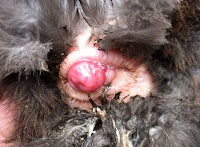By Vicki -
A prolapsed vent on a laying hen occurs when there is degeneration to the muscular system responsible for laying - it is a form of herniation. There are a number of possible reasons a hen can develop a prolapsed vent; it can occur when the shell of eggs is not forming properly due to a lack of calcium. Soft shelled eggs are harder to pass through the oviduct and can cause this strain injury. Hens can also be more prone to this injury if they are being forced to continue laying beyond their natural laying cycle (by using lamps to force laying in the sorter days of winter). A hen may also have issues with her conformation that make her more prone to develop a prolapse (pinched tail, wry tail and other bone or muscular issues).

(Photo credit to armorfirelady)
To help prevent a prolapsed vent:
1) Provide enough space for the hens to walk and scratch. This retains the muscle health of the hen.
2) Allow your flock to follow a natural laying cycle by not lighting the coop in the winter.
3) Provide a free-choice calcium supplement in its own container.
4) I have also read that common weed, Shepherds Purse (Capsella bursa-pastoris), provides a general boost to chicken health.
5) Provide a good diet.
6) Provide plenty of sunshine and fresh air.
However, if your chicken already has a prolapsed vent (signs: swollen red bottom, blood, egg oozing from cloaca, other hens pecking at her vent), you have to treat her.
However, if your chicken already has a prolapsed vent (signs: swollen red bottom, blood, egg oozing from cloaca, other hens pecking at her vent), you have to treat her.

(Photo credit to armorfirelady)
There are common and effective ways to treat your hen. The first step is to remove the hen from the flock to prevent cannibalization. Reduce the hens feed (or even don’t feed her for one day) to interrupt laying. This will give her a much needed break in laying. I never recommend adding lights to induce laying. If your birds are not laying there is a reason.

(Photo credit to armorfirelady)
Effective herbal care:
Wash the protruding organ in lukewarm water and using a natural oil (linseed oil or sweet oil), gently press the vent back into the body. Repeat several times as needed. Then wipe the vent area with a cloth or cotton ball that has been soaked inwitch hazel (Hamamelisvirginiana).
Witch hazel is an astringent and anti-inflammatory that tightens skin, soothes, reduces swelling. It is used, among other things, to relieve the pain of hemorrhoids and bruises.
Wash the protruding organ in lukewarm water and using a natural oil (linseed oil or sweet oil), gently press the vent back into the body. Repeat several times as needed. Then wipe the vent area with a cloth or cotton ball that has been soaked in
Witch hazel is an astringent and anti-inflammatory that tightens skin, soothes, reduces swelling. It is used, among other things, to relieve the pain of hemorrhoids and bruises.

Effective non-herbal care:
Wash the protruding organ in lukewarm water and using petroleum jelly, gently press the vent back into the body. Repeat several times as needed. Then treat the vent area with a combination of Preparation H and antibiotic ointment.Preparation-H reduces the swelling tissue and allows the tissue to recede.
Continue these steps until the hen is healed.
Wash the protruding organ in lukewarm water and using petroleum jelly, gently press the vent back into the body. Repeat several times as needed. Then treat the vent area with a combination of Preparation H and antibiotic ointment.
Continue these steps until the hen is healed.

(Photo credit to Bee)
In the event of a severe prolapse (if you truly do not wish to cull the bird), a purse suture to the cloaca may be needed. Contact your local veterinarian to find out if they can provide this procedure. If it happens a second time, I personally would cull the as it will likely be a continuing problem for the life of the bird.
- Vicki
- Vicki
No comments:
Post a Comment